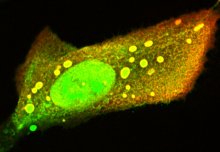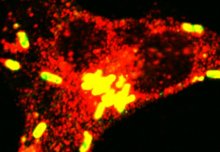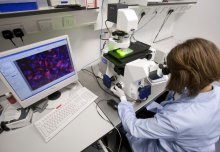

Cells shocked
Blocking cells' starvation response could help beat cancer
A new study at Imperial has shed light on how cells degrade their components to use as an energy source when they are starved or under stress.



Blocking cells' starvation response could help beat cancer
A new study at Imperial has shed light on how cells degrade their components to use as an energy source when they are starved or under stress.


New alliance to develop programme of lung cancer trials
Leading research institutions and hospitals across London have announced plans to transform lung cancer care with a programme of clinical trials.
 5
5


Sugary soft drinks linked to type 2 diabetes risk
Drinking one extra sugar-sweetened soft drink a day can increase a person's risk of developing type 2 diabetes by 22 per cent, a new study suggests.
 1
1


Modified bacteria could be used in vaccines
A modified strain of Salmonella could be used to efficiently deliver antigens, the key ingredients of vaccines, into human cells, a study suggests.
 1
1


Lord Darzi meets Suu Kyi to support healthcare reform in Burma
Professor Lord Ara Darzi met with Burma's opposition leader Aung San Suu Kyi on Tuesday.
 1
1


New centre aims to mend broken hearts
Imperial will lead one of three new British Heart Foundation (BHF) research centres focussed on repairing the damage caused by a heart attack.


Feature
Imperial College Podcast - 10 April 2013
Dr Anna Andreou talks about her research on headaches and two business leaders discuss diversity in the corporate world.
 1
1


'Diseases of affluence' spreading to poorer countries
High blood pressure and obesity are no longer confined to wealthy countries, a new study has found.


Magic mushrooms trial for depression delayed by red tape
Professor David Nutt says drug laws hinder research on clinical applications
 4
4


Bird flu mutation study offers vaccine clue
Scientists have described small genetic changes that enable the H5N1 bird flu virus to replicate more easily in the noses of mammals.
 1
1